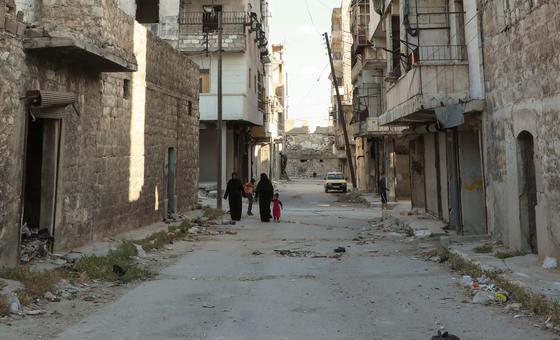Ambassadors unanimously adopted a resolution authorizing the renewal of the cross-border mechanism, a day before it was set to expire.
UN Secretary-General António Guterres has taken note of the development, his Spokesperson said in a statement, which described the humanitarian operation as an “indispensable lifeline” for some 4.1 million people in the region.
Expand humanitarian access
“The decision to confirm the extension of that authorization for an additional six months comes as humanitarian needs have reached the highest levels since the start of the conflict in 2011, with people in Syria grappling with a harsh winter and a cholera outbreak,” it said.
“Humanitarian access across Syria, including through cross-border and cross-line operations, must be expanded and humanitarian activities be broadened through investment in early recovery projects.”
Resolution 2672 facilitates aid transport via the Bab al-Hawa crossing through a mechanism established nearly nine years ago.
Reaching needy Syrians
The draft was submitted by Brazil and Switzerland, continuing the work of previous penholders, Ireland and Norway, who put forward a resolution last July that authorized operations for six months, or through 10 January 2023. Any extension would require a new resolution, it stipulated.
“This resolution allows humanitarian actors, particularly the United Nations and its agencies, to continue to reach those in need in a coordinated and carefully monitored manner,” said Swiss Ambassador Pascale Baeriswyl, speaking after the vote.
“Rapid, unimpeded and sustainable access is needed,” she added. “We call on all parties to facilitate the delivery of humanitarian aid.”
‘The bare minimum’: US Ambassador
While the vote “allows the Syrian people to breathe a sigh of relief”, much more could have been done, according to Linda Thomas-Greenfield, Ambassador of the United States.
Last July, the Council was unable to extend the mechanism for “a straightforward 12 months,” she said, thus making things harder and more costly for aid workers.
“So, while it is important that this Council came together today, let’s be honest with ourselves: This resolution represents the bare minimum,” said Ms. Thomas-Greenfield
“In fact, renewing this resolution should never have been a subject of debate. The debate we need to have, is how to strengthen the mechanism to reach more people with more assistance.”
Russia on Syrian sovereignty
Russia took the “difficult decision” to support the resolution’s adoption, Ambassador Vasily Nebenzya said in his explanation, stating that humanitarian aid is flowing “to a Syrian enclave that is inundated with terrorists.”
“As it currently stands, the resolution fails to reflect the aspirations of the Syrian people, who expect from the Security Council in addition to effective humanitarian efforts, respect for Syria’s territorial integrity and its sovereignty – not in words but in deeds,” he said, speaking through an interpreter.
“The maintenance of the cross-border mechanism, which encroaches upon the universally recognized norms of humanitarian assistance, in no way helps to advance this objective.”

